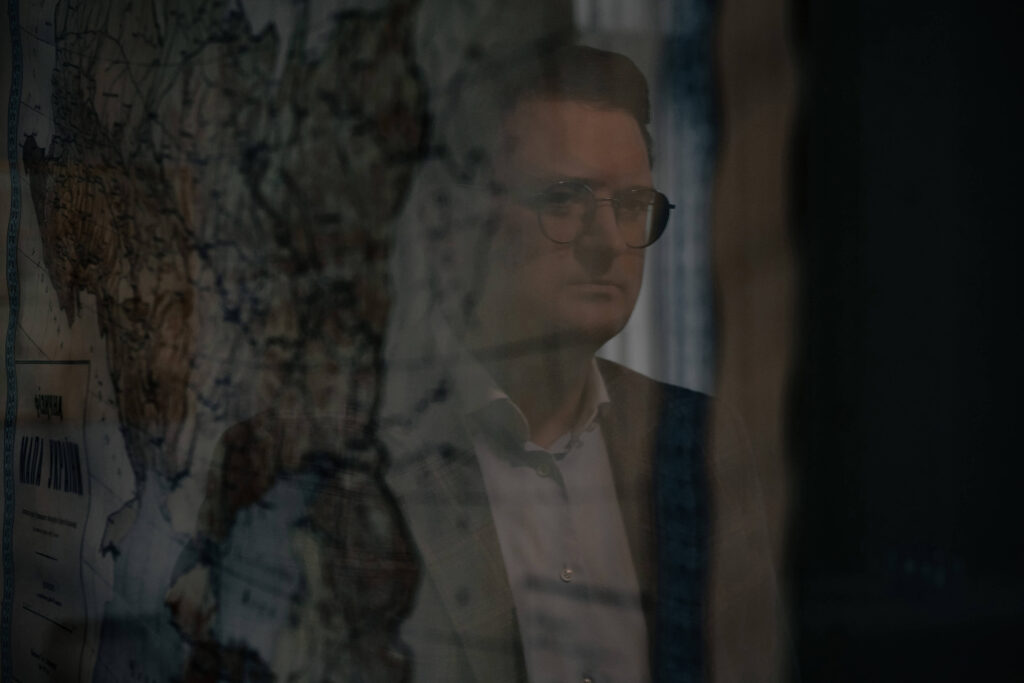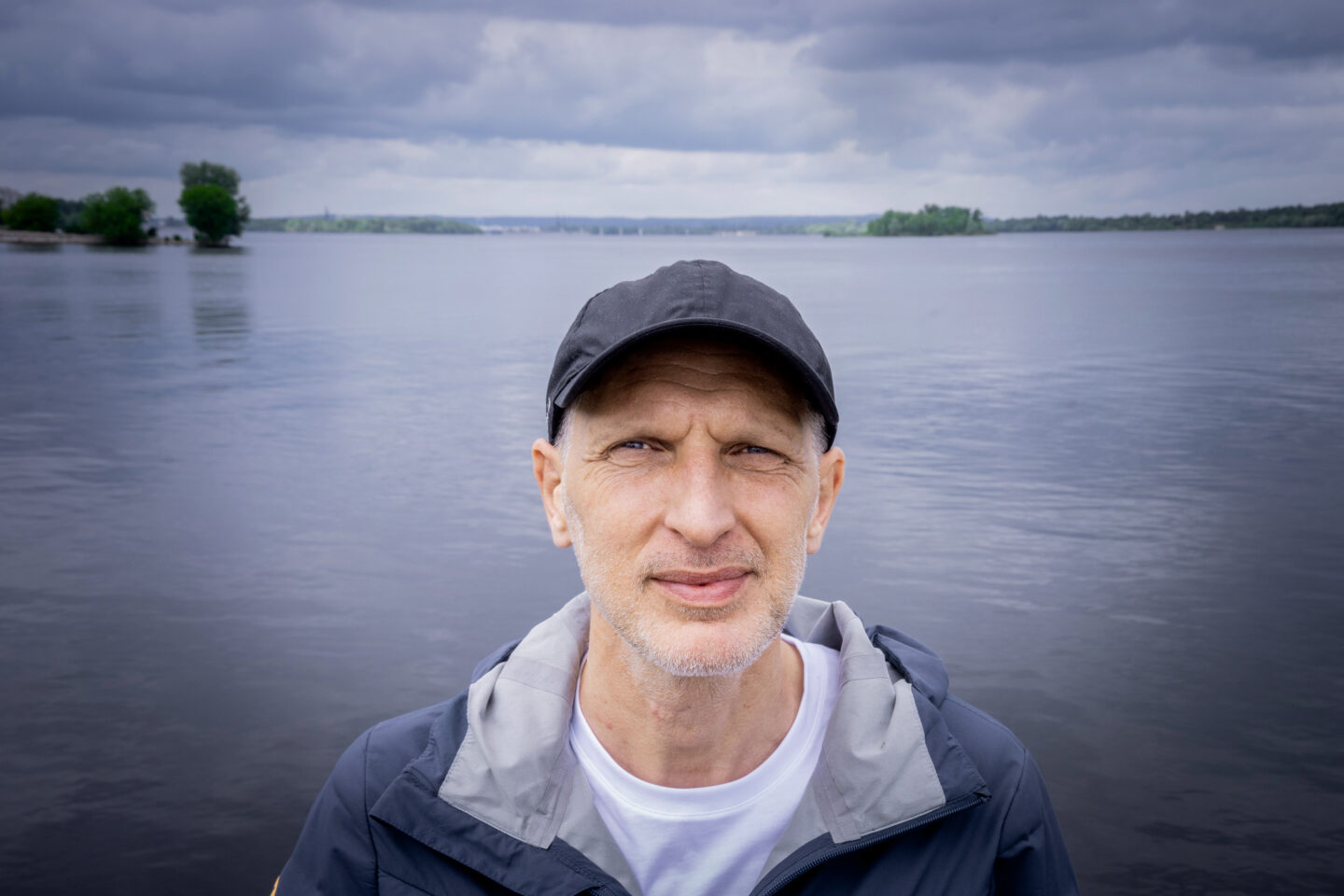§§§
Key statements from Oksana Zabuzhko’s speech at the Lviv Media Forum on May 25, 2023: war narrative and how past generations of Ukrainians remained invisible.
§§§
It is a great honor for me to be invited to the IX LMF: this is a wonderful opportunity to share a part of my experience as a writer with you.
For me, the past fifteen months have been associated with the narrative of war.
This moment signifies a shift in the discourse surrounding this war—a shift of narrative, of how the world talks about Ukraine, or more precisely, how Ukraine has finally begun to be heard this year.
Let me start with a quote, and I’d like you to guess when it first appeared in Western media: “Within the past few months, Ukraine, a nation unknown to the West, has come into the forefront of the world’s attention. Most people, I think, are prepared to say that they know little or nothing about it. For this deficiency in knowledge they need not blame themselves. There are good reasons for it. The suppressors of Ukraine took her that she be unknown; they indeed denied that she even existed. It would be difficult to imagine anything more reprehensible than this silencing of a nation which by ancient right belongs to the European family of nations. But uncontrollable events have now brought Ukraine into the international arena.”
Does anyone have any guesses as to when and where this passage might have been published?
These words belong to the British journalist Lancelot Lawton. Back in the 1930s, as the smog of totalitarianism thickened across Europe, he tried to alert British society to the significance of the Ukrainian issue in the imminent and inevitable conflict in Eastern Europe.
He delivered a speech on this subject to the Near and Middle East Association in 1939; this quote is from that address. Yet, Lawton’s warning went unheard. The West completely overlooked his lesson on Ukraine, and as a result, the situation remained unchanged for decades.
Our country’s appearance on the world’s political map in 1991 did not make it any more recognizable. In the European narrative, there simply was not room for Ukraine’s story for as long as Russia’s story continued—and until it was reconsidered.
Ukraine did exist in Western media—but only as a periphery of the Western world. Until February 24, 2022, the country was largely seen as the outskirts of Russia. “A legitimate suburb or the outskirts of Russia”: In fact, this “humorous” phrase was used during a discussion in one of the British media as recently as January 2022.
I know this because I was invited to take part in a rather curious conversation among UK intellectuals about how to, so to speak, “polish” Ukraine’s constitution to appease Putin.
The editors of this esteemed organization, which sent me the invitation, did not seem to realize how imperialistic that suggestion might sound to me. Naturally, I declined, but this phrase— “legitimate outskirts of Russia”—stayed with me.
The same term was used in a different part of Europe during the 1930s to describe other states and territories. The very fact that it is still in use today shows that, as a civilization, we continue to struggle with the lessons of 20th-century history.
Much has undoubtedly changed since Ukraine and its army shattered the stereotypes about Russia as a great power with the “world’s second-best” military, and about Ukraine as merely small Russian outskirts.
Yet, unfortunately, military victories still seem to define our narrative of success—like in the case of the battle for Kyiv. Once again, we would not have been heard, as has often been the case, if not for that triumph.
I am very tempted to direct your attention to an essay by Neil Abrams from the University of California, Berkeley, titled “Dear Illustrious Professors of International Relations: STOP. TALKING. ABOUT. UKRAINE.”
The essay, written in a wonderfully idiosyncratic style, is captivating. Abrams primarily critiques esteemed American international relations experts who advocate for a land-for-peace deal as the ideal solution to end the war. These people know nothing whatsoever about Ukraine. They fail to consider what Ukrainians themselves say about this issue.
Abrams reviews seven or eight similar articles, calling out big names like University of Chicago political scientist John J. Mearsheimer. He addresses them directly: “Do you feel compelled to publish an article about Russia’s war on Ukraine? [… ] Close your laptop, go outside, and take a walk. Meditate. Adopt a dog. Volunteer at a food bank. In fact, almost anything that doesn’t involve typing words on a page about Ukraine would be preferable to typing words on a page about Ukraine.”
But the question Abrams raises remains unanswered: Where do these distinguished professors find the temerity to imply they know better than Ukrainians about what’s in their best interests? If you do not question their certainty, the answer is simple: To them, Ukraine still does not have a voice of its own.
It has been fifteen months since the full-scale invasion began—fifteen months of a war that has seen triumphs on our side, proving the success of Ukraine’s thirty years of independence, nation-building, and the development of its society and military. Yet, in their eyes, we are still a voiceless nation, unable to speak for ourselves, and they believe they know better. Why is that?
Let me say something incredibly important about the war narrative—something that remains underappreciated by the media, politicians, decision-makers, and even intellectuals.
It’s not that Ukraine lacked attention from international media. A country is not truly known just because it makes the headlines.
The only way for a country to ensure it is heard and becomes the subject of its own history is to become recognized through its culture.
It’s not that Ukraine lacked international media attention.
Russia’s full-scale invasion in February 2022 marked the third time this century that Ukraine has dominated global headlines.
The first time Ukraine captured global attention was during the Maidan, or the Orange Revolution, in 2004. We saw it as a turning point when the West unexpectedly realized, to borrow from President Leonid Kuchma’s book title, “Ukraine is not Russia.” Yes, we had a civil society capable of fighting for democracy. Yes, we fought for fair and just elections, achieved our goal, and created a remarkable story. For about six months, Ukraine dominated the top news—an unusually long time. The color orange, symbolizing Ukraine, was in the global spotlight.
What happened next?
The narrative shifted. The Maidan slowly gave way to internal power struggles between corrupt politicians, and the world’s interest in Ukraine faded. Attention then turned to Moscow, and experts chimed in: “Look, if Ukrainians could do this, Russians might follow! A Maidan will surely happen in Russia soon! There’s no risk of Russia falling into dictatorship,” they claimed, “because Kyiv’s Maidan was a success.” People really believed that. Ukrainians and Russians, they said, were brotherly nations, nearly identical.
Ukraine continued to be seen as Russia’s “younger brother.”
“Alright,” they said, “even if there is some difference in political culture, it only proves that Ukraine is part of the former Soviet Union.” Up until February 24, 2022, we were still viewed as a former Socialist Soviet republic. I know this because I traveled to over twenty countries on a book tour, which gave me a wealth of sociological material for observation. In some Western countries, Ukraine was still being referred to as “a former Socialist republic.” Eventually, in Germany, I had enough and asked: “Do you still call Germany ‘a former Third Reich’?”
It’s the same kind of thinking—it’s part of your political history too, isn’t it?
Yes, we were once a socialist republic—that’s part of my country’s past. But there was another history too, one that stands apart from what Putin tells you. These other chapters of our history shaped our political culture just as much as those seven decades as a Socialist Soviet republic.
So, after the Maidan of 2004, the former Soviet Republic of Ukraine was seen as politically advanced, and the world’s attention shifted north—to Moscow.
Up until 2004, all reporters covering events in the former Soviet Union were based in Moscow. The Orange Revolution was the first event that made them come to Kyiv to see things for themselves. They discovered that we had electricity, running water, and sewage. That Kyiv was a large European city with restaurants, cafes, and fascinating historical sites. It was all great, but…At the time, the world did not show much interest in Ukrainian culture or history.
Marina Lewycka was the only Ukrainian writer who stepped onto the global stage after the Orange Revolution.
If you don’t remember her, I’m happy to remind you: She is a British writer who published A Short History of Tractors in Ukrainian. For an entire year, this was the only book about Ukraine, written in English, that Europeans curious about the country could buy or order to learn at least something about the country where the Orange Revolution had taken place.
By 2014, the situation had slowly begun to change when the second act of this great drama unfolded, and Ukraine became visible again for the second time in this century.
I no longer say, “They didn’t hear us”: They started to see us.
By 2014, Ukraine could already boast several internationally recognized contemporary writers.
Any independent country has writers like that. Take Albania, for instance—there’s Ismail Kadare. Sure, he lives in Paris, but anyone interested in Albania reads his books. By 2014, we had Kurkov, Zhadan, Zabuzhko (sorry for the shameless plug!), and Andrukhovych in Eastern Europe. At the very least, journalists knew who to contact when they needed a Ukrainian voice for commentary. We had these writers; their voices were heard, even if they weren’t topping bestseller lists in the European market.
However, I’d argue that this is a somewhat precarious position, as the cultural context of their works remained invisible to the international public or—even if it was visible—it was misinterpreted.
I once read a flattering review from an American critic for my book, The Museum of Abandoned Secrets. Among other things, he wrote: “This is especially impressive because, as far as my ignorant mind was concerned, it came out of nowhere.” In other words, Ukraine had its voices in literature or music—but we came out of nowhere.
We were not seen as representatives of a cultural and literary tradition spanning millennia. Our past generations remained invisible. We came out of nowhere.
Why “out of nowhere”?
Because this American critic did some googling and found no Ukrainian classics or modernist texts translated into English. So, he concluded: It’s not that they have not been translated—it’s that they simply do not exist.
This is how we were perceived: as a country without a past, without history, without culture, without traditions.
A country without history may have aspirations for the future and a young, brave civil society. But it remains a voiceless nation—a country still learning how to speak about itself. So, it cannot be taken seriously. Mr. Putin’s voice will always be louder. When he steps onto the international stage and delivers his spiel about Ukraine’s past, it is accepted at face value. He has the right to do this because Russia’s history is well-known. Until last year, all Slavic studies departments were essentially departments of Russian language and literature. These Slavic—or rather, Russian—departments sold the stories Putin presented to the world to would-be politicians and decision-makers. Only now is this changing, and decolonization is finally underway.
At Oxford University, I was told that “decolonization” is now the buzzword in all Slavic language departments.
In 2014, the Maidan took place, once again proving that civil society could rise up against dictatorship. But every time, the narrative remained the same.
In February 2022, a day after the full-scale invasion began, I watched a conversation on CNN between historians Anne Applebaum, Timothy Snyder, and Yuval Noah Harari, discussing Ukraine.
I remember the title: “The War in Ukraine and the Future of the World.” The discourse was identical to what I had heard in 2004 and 2014: the world would finally discover Ukraine; Ukraine has a civil society; Ukraine is resisting Russian aggression. And then, Yuval Noah Harari repeated the same old line: If Ukrainians are a brotherly nation to Russians, perhaps this Putin’s war can be stopped by protests in Russia.
This was February 25, 2022, and those words were spoken by someone considered a respected historian—at least in that part of the world.
So, what is changing now, after the full-scale invasion? What efforts are being made to reshape these narratives, and why do we need to work on this?
For the first time, we finally saw the Russian-Ukrainian relations being earnestly reviewed in the historical context.
My most recent book, The Longest Journey, was actually commissioned by an Italian publisher—the first time I’ve ever written a book on commission. The request was simple: “Please explain what we’ve missed in the historical and cultural context of this war.” I told them: “I’m afraid I’ll have to go back to the 17th century to start.”
Yes, we must begin from very far back. And this work has already started.
For the first time in recent decades, Ukrainian authors are being translated into European languages, and their books are finding commercial success. Please make sure not to miss Cassandra, a theater production based on Lesia Ukrainka’s play of the same name. Believe me, it took me ten years to convince European theater directors to stage Cassandra. It’s the most urgent drama of our time, written with the foreboding of a world war.
However, it’s only now, thanks to the triumphs of the Ukrainian army, that Lesia Ukrainka’s play has finally made it to European theater stages, including a production in London.
This is how a country is truly understood. Culture works on a personal level. When you identify with a protagonist in a book or movie, when a piece of music becomes part of your personal experience—that’s when you can genuinely understand a country. Not as some troubled postcolonial territory you hear about in the news, but through real dialogue, an exchange of ideas and messages. That is democracy; that’s the world we all want to live in.
Oksana Zabuzhko, Ukrainian writer, one of the most translated Ukrainian authors.
Translation — Hanna Leliv
§§§
[The translation of this publication was compiled with the support of the European Union and the International Renaissance Foundation within the framework “European Renaissance of Ukraine” project. Its content is the exclusive responsibility of the authors and does not necessarily reflect the views of the European Union and the International Renaissance Foundation]





